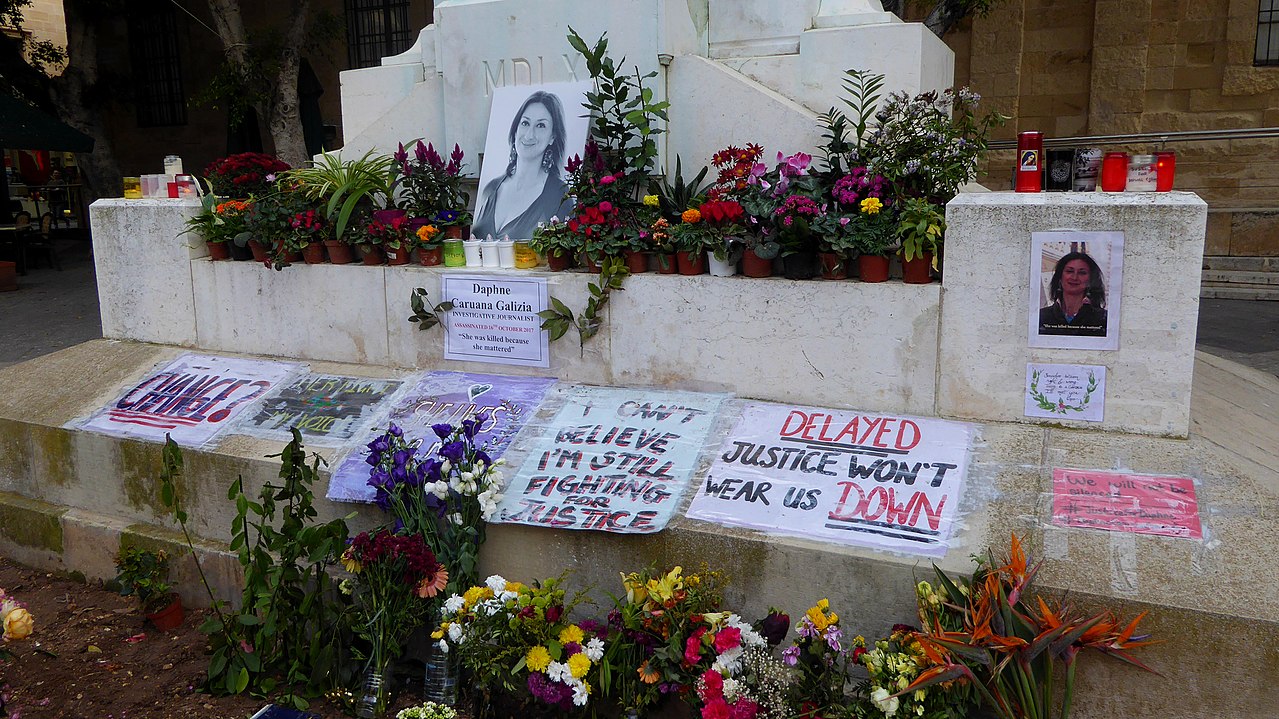This post is also available in: Français (French) العربية (Arabic)
On September 5, Gauri Lankesh, 55, had just completed her editorial “In the Era of Fake News” and was about to enter her home in Bangalore when she collapsed on her doorstep. Four bullets had just pierced through her body, and she died instantly. One month later, on 16 October 2017, Malta’s most disruptive journalist, Daphne Caruana Galizia, 53, was burned alive when her car exploded, practically right before her son’s eyes.
Tenacious and unwaveringly committed to the truth, these two experienced journalists had both ended up founding their own media platforms to document their countries’ hidden realities. In 2005, Gauri Lankesh created the “Gauri Lankesh Patrike” weekly, in which she documented corruption cases, the rise of nationalists, and inter-religious conflicts in the state of Karnataka for a good decade. Shortly before her death, she was mostly denouncing the dealings of the Indian far right, embodied by the Bharatiya Janata (BPJ), calling out the disinformation practices of the right-wing Hindu nationalist party. “He believes in the power of a lie acquiring the garb of truth with constant repetition,” she wrote of former BPJ Prime Minister Atal Bihari Vajpaye. To thwart viral rumors that taint factual information, she planned to set up a participatory fact-checking project with her colleagues.

Around the same time, Daphne Caruana Galizia was managing the blog she’d launched in 2008, “Running Commentary”, followed by millions of Maltese. She relentlessly hunted down the corruption plaguing her island—a national scourge the cogs of which she fully intended to dismantle. She particularly focused on the Panama Papers affair in which Joseph Muscat, the Prime Minister in power from 2013 to 2020, is involved. She also investigated the mechanisms that made Malta a veritable tax haven, granting wealthy foreigners passports of convenience. In the time leading up to her assassination, she was fixated on the new gas and electricity plant, Electrogas. The largest public contract on the island seemed suspicious to her: she was trying to understand the mechanism by looking into the 600,000 emails that were leaked from the consortium, which she managed to get her hands on. Unfortunately, she did not have the time to decode them. Politico magazine described the investigator in the following terms: “a one-woman WikiLeaks, crusading against untransparency and corruption in Malta.”
“We couldn’t allow our mother’s stories to die with her. They were too important. For them to be forgotten would have been like killing her twice”
Harassed, threatened, killed…
It is precisely their crusades against lies and corruption that subjected the two journalists to harassment campaigns and threats which ultimately lead to their tragic deaths. Gauri Lankesh was dragged through the mud on social media, called a “Presstitute”, and lawsuits were being filed against her left and right. A truncated video, unwittingly making her look like she was making remarks against Hinduism, was made to circulate and go viral in circles of the far right. This very material is what her eventual assassins were indoctrinated with before they killed her. Gauri’s entourage encouraged her to hire a bodyguard, but she preferred to downplay things.
In her own way, the Maltese journalist adopted a similar attitude: she refused to stay silent and went on with her work against all odds. Insulted, ostracized, and demonized by the politicians she was investigating, she was not only the victim of cyberbullying, but one of her dogs was left in front of her door, its throat slashed, and two others were poisoned. People also tried to burn down her house on two separate occasions.
What had these two journalists discovered to be made to pay with their lives for the revelations they were about to divulge? Who ordered their assassination? And what to do with the extraordinary reservoir of information they have left behind, waiting to be deciphered?
From “The Daphne Project” to “Story Killer”: a strong message to the enemies of the free press
The investigative collective Forbidden Stories, a consortium of local and international media, has undertaken the work left uncompleted by the two journalists, and this will in turn shed light on the motive for their assassination. “By protecting and pursuing the work of journalists who can no longer complete their investigations, we can send a powerful signal to enemies of the free press: even if you succeed in stopping a single messenger, you will not stop the message,” we can read on the Forbidden Stories website.
In The Daphne Project, 45 journalists from 18 international media platforms were called upon to collaborate, including Le Monde, Radio France, Reuters, and Time of Malta. Their investigations contributed to shaking up a judicial inquiry that had been stalled due to political interference. These political powers were supported by the police and the judiciary, which explains the stalling. Maltese civil society, indignant, started to protest and pushed then-Prime Minister Joseph Muscat to resign on 13 January 2020.

The joint investigation sheds light on the connection between three bombers, the intermediate Melvin Theuma, and the powerful Maltese businessman Yorgen Fenech, “identified as being the central figure of an opaque financial system going back to the highest level of the Maltese State” (1). We can indeed find him at the head of the Electrogas consortium as well as at the helm of 17 Black, a company registered in Dubai that paid sums of money to secret accounts in Panama belonging to Konrad Mizzi, the Minister for Tourism, as well as to Keith Skembri, Chief of Staff to Prime Minister Joseph Muscat. In November 2019, Yorgen Fenech, who attempted to escape on his yacht, was intercepted and arrested not far from the Port of Valletta. He was accused of having ordered the assassination of the Maltese blogger. “I want to kill Daphne Caruana Galizia,” the tycoon said to Melvin Theuma, his driver and stooge, while leaving a club. The Maltese prosecutor’s office asked for a maximum sentence of life imprisonment.
“We couldn’t allow our mother’s stories to die with her. They were too important. For them to be forgotten would have been like killing her twice,” Matthew Caruana Galizia tells Forbidden Stories. He is also an investigative journalist, and with his brothers he founded the Daphne Caruana Galizia Foundation to reconstruct the scenario that cost this woman of exemplary courage her life.
The new disinformation industry, backed by a cohort of mercenaries and private companies, has infested the media ecosystem and public opinion
Five years after the assassination of the Indian journalist, Forbidden Stories, which now has several major investigations under its belt, gathered journalists from 30 media outlets to follow Gauri Lankesh’s tracks and look into this disinformation phenomenon. Into “these lie factories,” which Lankesh sensed were on the rise globally. Their investigations, which lasted six months and traced narratives back to India, Latin America, Europe, Israel, and more, came to fruition last February. The Investigation Unit of Radio France, media partner of “Story Killer”, took us to Israel where we discovered Team Jorge, a phantom company “providing massive disinformation campaigns around the world”. From delegitimization scenarios to electoral tampering, Team Jorge is capable of generating thousands of avatars and fake accounts and of mobilizing armies of trolls to bring down a government or destroy someone’s character.
The new disinformation industry, backed by a cohort of mercenaries and private companies, has infested the media ecosystem and public opinion all over the world, jeopardizing freedom of expression and democracy. It does so with the help of artificial intelligence, this ultra-powerful technology which is capable of exceedingly violent manipulation, its violence targeting women in particular. It must not be forgotten that women are 27 times more likely to be harassed on social media than men. All the more so when they are journalists.
In 2017, the year in which Gauri and Daphne were murdered, the European Women’s Lobby presented research showing that cyberviolence against women is not “a series of isolated acts, but a systemic scourge.” Lauren Bastide, in the documentary “#Sale pute” by two Belgian directors, Florence Hainaut and Myriam Leroy, themselves victims of cyber-harassment, states loud and clear: “Speaking up in public is hell for a woman.” In this hell, information can cost someone their life.



























